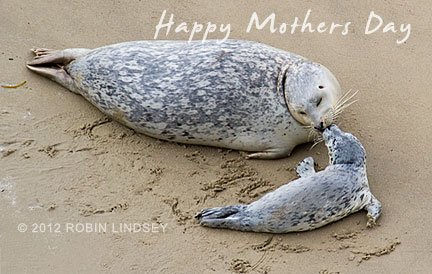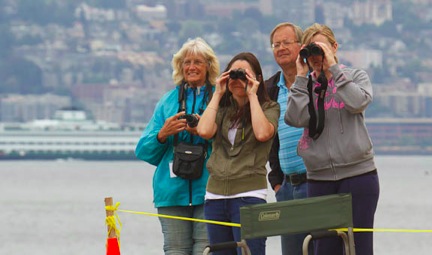stranding network
Happy Mother's Day to moms of all species
May/13/12 06:45 AM

Seal pupping season has begun on the outer coasts of Washington and Oregon. Please give harbor seals space and don’t worry if you see a pup alone on the beach. Most likely, the pup is already on his own, but sometimes a still-nursing pup will be left alone on shore. Always stay back and keep dogs leashed. If you have any concerns at all about a pup (or other marine mammal), please call the stranding network for your area.
Harbor porpoise strands in Snohomish County
Nov/21/11 04:46 AM
Both our hotline and Edmonds Seal Sitters received calls about a “dolphin” washed up on a beach north of Edmonds. The animal turned out to be a harbor porpoise, likely a subadult in fairly good condition, with no obvious trauma or visible cause of death. Volunteers took photos, measurements, location information and secured the animal for pickup by a NOAA researcher for necropsy. Recovering the bodies of dead marine mammals is valuable to science and the environment. These necropsies allow us a window not only into the health of the population, but the health of the Sound as well.
Harbor porpoise, the smallest of the porpoise family at 5-5.5 feet long, are local to Puget Sound. They have a grey back and lighter to white belly. The dorsal, or top fin on their back, is a small triangle which differs from the more well-known dolphin with the classic curved dorsal fin. Washington’s largest and best known marine mammals, orcas, are actually the largest of the dolphin species with their distinctive tall, curved dorsal.
If you find a dead or live stranded dolphin or whale on the beach, do not touch or move it. Call the stranding network and keep people and dogs away for both their safety and the safety of the animal. To find your local stranding network and to learn more about strandings, click here.
Harbor porpoise, the smallest of the porpoise family at 5-5.5 feet long, are local to Puget Sound. They have a grey back and lighter to white belly. The dorsal, or top fin on their back, is a small triangle which differs from the more well-known dolphin with the classic curved dorsal fin. Washington’s largest and best known marine mammals, orcas, are actually the largest of the dolphin species with their distinctive tall, curved dorsal.
If you find a dead or live stranded dolphin or whale on the beach, do not touch or move it. Call the stranding network and keep people and dogs away for both their safety and the safety of the animal. To find your local stranding network and to learn more about strandings, click here.
Stranding Networks play important role in Northwest
Oct/07/11 07:59 PM

“Seal Sitters MMSN, part of NOAA's Northwest Marine Mammal Stranding Network, responds to reports of live and dead marine mammals from West Seattle to Marysville. The NWMMSN consists of a number of organizations, including WA Dept of Fish and Wildlife and Cascadia Research, and many volunteers who cover the entire inner and outer coast of Washington and Oregon. Seal Sitters has a signed agreement with NOAA and therefore has the authority to establish any necessary perimeter around a marine mammal to prevent disturbance or harassment, as per federal law passed in 1972 - the Marine Mammal Protection Act. While NOAA recommends that people stay a minimum of 100 yards away, we realize that is not always possible in an urban environment. We make every attempt to enable a marine mammal to rest onshore without greatly inconveniencing the public. That said, our primary goal is protection and safety for both the animal and the public. Sometimes, there may be a slight inconvenience in order to do so.
Seal Sitters is an all-volunteer organization and does this service and educational outreach with no monetary compensation from the City, State or NOAA.”
Please, respect both the barriers and the volunteers who donate many selfless hours, sometimes under trying circumstances. Already this season, we have had many days with pups in multiple locations. Volunteers Eilene and David (photo above) are among those who tirelessly educate the public about lovable seal pups, such as Henry along Alki Avenue. Seal Sitters greatly appreciates the support and cooperation of our community! We do have many operational expenses throughout the year, including maintaining our dedicated phone hotline and websites, as well as printed outreach and training materials. If you’d like to make a tax deductible donation to help us continue this valuable work, please click here.







